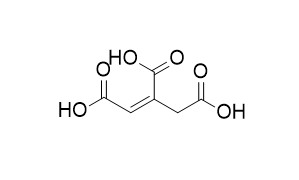cis-Aconitic acid
cis-Aconitic acid shows a strong antiviral activity against human immunodeficiency virus type 1 and/or 2.It also shows anti-hypertrophic effects in cardiomyocytes.
Inquire / Order:
manager@chemfaces.com
Technical Inquiries:
service@chemfaces.com
Tel:
+86-27-84237783
Fax:
+86-27-84254680
Address:
1 Building, No. 83, CheCheng Rd., Wuhan Economic and Technological Development Zone, Wuhan, Hubei 430056, PRC
Providing storage is as stated on the product vial and the vial is kept tightly sealed, the product can be stored for up to
24 months(2-8C).
Wherever possible, you should prepare and use solutions on the same day. However, if you need to make up stock solutions in advance, we recommend that you store the solution as aliquots in tightly sealed vials at -20C. Generally, these will be useable for up to two weeks. Before use, and prior to opening the vial we recommend that you allow your product to equilibrate to room temperature for at least 1 hour.
Need more advice on solubility, usage and handling? Please email to: service@chemfaces.com
The packaging of the product may have turned upside down during transportation, resulting in the natural compounds adhering to the neck or cap of the vial. take the vial out of its packaging and gently shake to let the compounds fall to the bottom of the vial. for liquid products, centrifuge at 200-500 RPM to gather the liquid at the bottom of the vial. try to avoid loss or contamination during handling.
J Microbiol Biotechnol.2022, 32(2):141-148.
Phytomedicine.2024, 128:155527.
Evid Based Complement Alternat Med.2022, 9767292,2.
Anal Sci.2019, 35(12):1317-1325
J Agric Food Chem.2024, acs.jafc.4c01387.
J Pharmaceut Biomed2020, 182:113110
Plant Foods Hum Nutr.2021, 76(4):472-477.
Toxicol In Vitro.2019, 59:161-178
Metabolites2022, 12(6),507.
Research on Crops.2017, 18(3):569
Related and Featured Products
Applied Microbiology and Biotechnology, 2008, 80(2):223-229.
Cloning and functional characterization of the cis-aconitic acid decarboxylase (CAD) gene from Aspergillus terreus.[Reference:
WebLink]
A filamentous fungus Aspergillus terreus produces itaconic acid, which is predicted to be derived from cis-Aconitic acid via catalysis by cis-Aconitic acid decarboxylase (CAD) in the carbon metabolism of the fungus.
METHODS AND RESULTS:
To clarify the enzyme's function and a pathway for itaconic acid biosynthesis, we cloned a novel gene encoding the enzyme. The open reading frame of this gene (CAD1) consists of 1,529 bp encoding 490 amino acids and is interrupted by a single intron. Among the identified proteins in the database, the primary structure of the protein encoded by CAD1 shared high identity with the MmgE/PrpD family of proteins, including a number of 2-methylcitrate dehydratases of bacteria. The cloned gene excluding an intron was introduced into the expression plasmid pAUR-CAD1 controlled by the ADH1 promoter. The CAD activity in Saccharomyces cerevisiae was confirmed by directly detecting itaconic acid as a product from cis-Aconitic acid as a substrate.
CONCLUSIONS:
This result reveals for the first time that this gene encodes CAD, which is essential for itaconic acid production in A. terreus.
AIDS Research and Human Retroviruses, 01 Jun 1996, 12(9):769-775.
Antiviral effects of milk proteins: acylation results in polyanionic compounds with potent activity against human immunodeficiency virus types 1 and 2 in vitro.[Reference:
WebLink]
METHODS AND RESULTS:
A number of native and modified milk proteins from bovine or human sources were analyzed for their inhibitory effects on human immunodeficiency virus type 1 (HIV-1) and HIV-2 in vitro in an MT4 cell test system. The proteins investigated were lactoferrin, alpha-lactalbumin, beta-lactoglobulin A, and beta-lactoglobulin B. By acylation of the amino function of the lysine residues in the proteins, using anhydrides of succinic acid or cis-Aconitic acid, protein derivatives were obtained that all showed a strong antiviral activity against human immunodeficiency virus type 1 and/or 2. The in vitro IC50 values of the aconitylated proteins were in the concentration range of 0.3 to 3 nM. Succinylation or aconitylation of alpha-lactalbumin and beta-lactoglobulin A/B also produced strong anti-HIV-2 activity with IC50 values on the order 500 to 3000 nM. All compounds showed virtually no cytotoxicity at the concentration used. Peptide-scanning studies indicated that the native lactoferrin as well as the charged modified proteins strongly bind to the V3 loop of the gp120 envelope protein, with Kd values in the same concentration range as the above-mentioned IC50.
CONCLUSIONS:
Therefore, shielding of this domain, resulting in inhibition of virus-cell fusion and entry of the virus into MT4 cells, may be the likely underlying mechanism of antiviral action.
Nitric Oxide,2015,46(30):114-122.
Hydrogen sulfide improves glucose metabolism and prevents hypertrophy in cardiomyocytes.[Reference:
WebLink]
Introduction Hydrogen sulfide (H2S) has been reported to inhibit myocardial hypertrophy in a cell model of cardiomyocyte hypertrophy. Our previous study also shows an H2S-induced increase in glucose metabolism in insulin-targeting cells. The present study aims to examine the hypothesis that H2S attenuates myocardial hypertrophy and promotes glucose utilization in cardiomyocytes.
METHODS AND RESULTS:
The cell model of cardiomyocyte hypertrophy was induced by application of phenylephrine and cardiomyocyte hypertrophy was examined using leucine incorporation assay. Protein levels were measured using Western blot analysis. The activity of related enzymes was measured with enzyme-linked immunosorbent assay (ELISA). Results NaHS (an H2S donor) treatment increased the activity of cultured cardiomyocytes and reduced hypertrophy in cultured cardiomyocytes at concentrations ranging from 25 to 200 µmol/L. NaHS treatment increased glucose uptake and the efficiency of glycolysis and the citric acid cycle. The key enzymes in these reactions, including lactate dehydrogenase and pyruvate kinase and succinate dehydrogenase, were activated by NaHS treatment (100 µmol/L). Some intermediates of glycolysis and the citric acid cycle, including lactic acid, cyclohexylammonium, oxaloacetic acid, succinate, L-dimalate, sodium citrate, cis-Aconitic acid, ketoglutarate and DL-isocitric acid trisodium also showed anti-hypertrophic effects in cardiomyocytes.
CONCLUSIONS:
H2S improves glucose utilization and inhibits cardiomyocyte hypertrophy.



